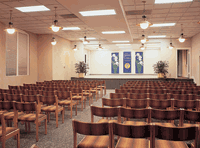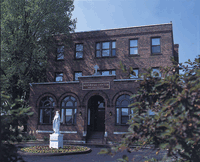» Consultation 2006
Empowering Christian Leaders for the Next Generation:
Consultation for Emerging Leaders
January 3-11, 2007
St. Louis, Missouri, USA
 The IWC week-long January consultation will be a select gathering up to 70 younger Christian leaders (mostly under 35 years of age) who will (1) pray and worship the Lord together, (2) listen to and learn from one another about what God is doing in churches throughout the world, and (3) develop new strategies and plans during the week for their own fields of ministry and Christian service. The food and housing costs in St. Louis will be met by the IWC, and, in most cases, the travel expenses to and from St. Louis will also be covered.
The IWC week-long January consultation will be a select gathering up to 70 younger Christian leaders (mostly under 35 years of age) who will (1) pray and worship the Lord together, (2) listen to and learn from one another about what God is doing in churches throughout the world, and (3) develop new strategies and plans during the week for their own fields of ministry and Christian service. The food and housing costs in St. Louis will be met by the IWC, and, in most cases, the travel expenses to and from St. Louis will also be covered.
What is the purpose of this gathering?
 Within a generation's time, the church's younger leaders (i.e., mid-30s and younger) will rise into positions of senior leadership and their relationships with one another - or lack thereof - will play a large part in determining whether the larger Christian world is fragmented or unified. During the mid-twentieth-century, there was a saying that "the world is too strong for a divided church." This expression may be even more applicable today. Many of contemporary problems faced by congregations, denominations, and churches can only be adequately addressed through a unified effort among Christian believers. The IWC consultation aims at bringing together a select group of some sixty to seventy younger Christian leaders for a week's time to pray and worship together, to learn about one another's life experiences, to share ideas and strategies for ministry, and to lay a foundation for future contact, communication, and collaboration among themselves.
Within a generation's time, the church's younger leaders (i.e., mid-30s and younger) will rise into positions of senior leadership and their relationships with one another - or lack thereof - will play a large part in determining whether the larger Christian world is fragmented or unified. During the mid-twentieth-century, there was a saying that "the world is too strong for a divided church." This expression may be even more applicable today. Many of contemporary problems faced by congregations, denominations, and churches can only be adequately addressed through a unified effort among Christian believers. The IWC consultation aims at bringing together a select group of some sixty to seventy younger Christian leaders for a week's time to pray and worship together, to learn about one another's life experiences, to share ideas and strategies for ministry, and to lay a foundation for future contact, communication, and collaboration among themselves.
What distinguishes this event from other church conferences?
Many church conferences are focused on the main speakers. By contrast this consultation is focused on the participants, and on the experiences, expertise, and energy that each one brings to the mix of people in attendance. It is based on the assumption that the younger leaders in the churches today collectively possess a wealth of faith, insight, wisdom, and resources that need to be shared and exchanged more fully among themselves. A number of people attending the consultation will function as facilitators for discussion and interchange among the participants, but their role is to serve the participants and not to become the focus of attention. The schedule for the consultation will allow adequate time for informal interaction and communication among the participants.
 Learn more about the facility where the participants will stay-the Manresa Center, affiliated with Saint Louis University-by clicking here.
Learn more about the facility where the participants will stay-the Manresa Center, affiliated with Saint Louis University-by clicking here.
Sample One-Day Schedule
| January 5-Friday | |
| 8:00-9:00 a.m. | Breakfast |
| 9:00-9:30 a.m. | Morning Liturgy |
| 9:30-10:30 a.m. | Contemporary Worship and Large Group Prayer |
| 10:30-10:45 a.m. | Break |
| 10:45-11:15 a.m. | Small Group Intercessory Prayer |
| 11:30 - 1:00 p.m. | Lunch |
| 1:00 - 4:30 p.m. | Individual Introductions (5 min. each; groups of ten during each hour, with 10 minutes at the end of each hour for questions and answers) |
| 4:30- 5:30 p.m. | Free time |
| 5:30- 7:00 p.m. | Dinner-Presentation "Collaboration in Service" with Rev. Sayo Ajiboye |
| 7:00-7:45 p.m. | Breakout groups for discussion following presentation |
What sort of person is being sought as a participant in the consultation?
 The following are among the most important qualities sought in younger leaders who might be participants in the consultation:
The following are among the most important qualities sought in younger leaders who might be participants in the consultation:
- A record of faithful service in Christian ministry. We are especially interested in those who have participated in diverse forms of ministry (e.g., preaching, evangelization, mercy ministry or relief work, education, counseling, etc.) and will be able to communicate to others what they are learning. "Ministry" in this context includes those who are lay ministers and have not received formal church ordination as a minister of word and sacraments.
- An openness to learning from those outside of one's own tradition and culture. The IWC is founded on the idea that Christians in different cultures and traditions need to learn from one another. Thus participants in this consultation need to be open to collaborating with others and to developing new and innovative approaches to Christian ministry.
- An adherence to historic Christian orthodoxy. For participants in the IWC, the teachings embodied in The Apostles' Creed and The Nicene Creed are of vital importance and they function as a point of connection among Christian believers.
- A high level of facility in spoken English. Because it is not possible for us to provide for simultaneous translations into the many mother tongues of those who will be participating in the IWC, we will be using English as the official language in all our presentations and discussions. It is important for our consultation participants to be fluent in spoken English, so that they can effectively communicate with others and also so that they can derive maximum benefit from the consultation.
- A Christian leader in early to mid-life. Because the IWC is focused on the rising generation of Christian leaders, this consultation is not intended for late-life and senior leaders. While there is no strict age limit for applicants, the majority of anticipated participants will be 35 years old or younger and many are likely to be under 30 years of age.
- A recommendation from a senior church leader. Applicants for the consultation have the option of submitting up two letters of reference, but at least one recommendation letter is needed (preferably submitted by email).
How will the IWC decide who will be accepted into the consultation?
A review board will prayerfully consider all applicants and seek to assemble a group of qualified participants who are diverse in terms of their theological and denomination traditions, geographical regions, gender, and ministry emphases. Those who are recommended for participation at the website (www.worldchristianity.org) will first be contacted, and then considered as applicants if they so desire. Personal character--as evidenced by the application and recommendation--may matter as much as one's formal education or denominational position.
How will local churches and individuals in the St. Louis area participate in the consultation?
Both individuals and local congregations in the St. Louis region are playing an indispensable role by sponsoring individual participants and paying for their travel costs. Local congregations will help by transporting participants to and from the airport, and by hosting participants on Sunday, January 7. Moreover, members of local churches will prepare and serve meals during the week.
